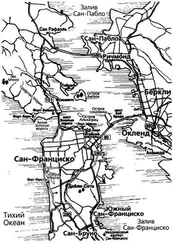It would have been surprising if she hadn’t. It would have been surprising if she hadn’t caught the attention of every man there. But there was no surprise. She did. She would have won any Miss Europe contest hands down if she had had a face other than her own which, though pleasant and plump, was rather plain. But any possible lack of attraction in that cheerfully smiling face was more than over-compensated for elsewhere. She was dressed in a gaily-patterned dirndl and Tyrolean blouse, had a hand-span waist, an hour-and-a-half-glass figure and an obvious predilection for low-cut blouses, that in terms of attracting local custom, must have been worth a fortune to the gigantic proprietor behind the bar. She drew a great deal of attention from the assembled soldiery, not all of it just consisting of admiring glances: if she weren’t wearing armour-plating, Smith reflected, she must be permanently black and blue. She approached Smith, brushed back her blonde hair and smiled, the gesture as provocative as the smile.
‘Can I help you, sir?’
‘Dark beer, please,’ Smith said politely. ‘Six.’
‘With pleasure, sir.’ Again the provocative smile, this time accompanied by a half-appraising, half-lingering look from cornflower blue eyes, then she turned and walked away, if her method of locomotion could strictly be described as walking. Schaffer, a slightly dazed expression on his face, stared after her, then caught Smith by the arm.
‘ Now I know why I left Montana, boss.’ His voice held something of the dazed quality on his face. ‘It wasn’t because of the horses after all.’
‘Your mind on the job if you don’t mind, Lieutenant.’ Smith looked thoughtfully after the girl, rubbed his chin and said slowly: ‘Barmaids know more about what’s going on in their own manor than any chief of police – and that one looks as if she might know more than most. Yes, I’ll do that.’
‘Do what?’ Schaffer asked suspiciously.
‘Try to get next to her.’
‘I saw her first,’ Schaffer said plaintively.
‘You can have the next dance,’ Smith promised. The levity of the words was belied by the cool watchful expression on his face as his eyes constantly travelled the room. ‘When you get your drinks, circulate. See if you can hear any mention of Carnaby or Reichsmarschall Rosemeyer.’
He caught sight of an empty chair by a corner table, moved across and sat in it, nodding politely to a rather bleary-eyed Alpenkorps captain deep in what appeared to be rather patronizing conversation with two lieutenants. The captain showed no more than a brief recognition of his presence and, as far as Smith could tell, no other person present was showing the slightest interest in either himself or his companions. The accordion band finished its stint more or less on the same note and at the same time and the singing of ‘Lili Marlene’ died away. For long seconds there was a profound and nostalgic silence, four hundred men alone with Lili Marlene under the barrack gate lantern, then, as if on cue, a babel of voices broke out all over the room: four hundred men with unfinished litre mugs do not remain sentimental for overly long.
He caught sight of the girl returning with six Steinbechers on a tray, pushing her way through the crowd and fending off admirers with a practised hand. She gave drinks to Smith’s men who immediately but unostentatiously broke up and began to wander away into different parts of the room. The girl looked around, located Smith, smiled brightly, crossed to his table, and put the Steinbecher on it. Before she could straighten, Smith put his arm around her waist and pulled her on to his knee. The Jäger captain across the table broke off his conversation, stared across in startled disapproval, opened his mouth as if to speak, caught Smith’s discouraging glance, decided to mind his own business and resumed his conversation. Smith, in his turn, looked away, squeezed the girl’s waist, patted her knee and smiled what he hoped was a winning smile.
‘And what might your name be, my Alpine rose?’ His voice had a slightly slurred edge to it.
‘Heidi.’ She struggled to rise, but didn’t really put her heart into it. ‘Please, Major. I have work to do.’
‘There is no more important work than entertaining soldiers of the Fatherland,’ Smith said loudly. Holding Heidi firmly to forestall any attempt at escape, he took a long pull at his beer, then continued, quietly now, the mug still in front of his face: ‘Shall I sing you a song?’
‘What song?’ Heidi asked warily. ‘I hear too much singing.’
‘I whistle better than I sing. Listen.’ He whistled, very softly the first two bars of ‘Lorelei’. ‘Do you like that?’
Heidi stiffened and stared but immediately relaxed and smiled at him coquettishly.
‘It’s very nice, Major. And I’m sure you have a beautiful singing voice, too.’
Smith put his Steinbecher down with an unsteady bang that brought more disapproval from the other side of the table then lifted his hand to wipe the froth from his lips. Heidi smiled down at him, but the wary eyes weren’t smiling.
Smith said from behind his hand: ‘The men at the bar? The civilians? Don’t turn round.’
‘Gestapo.’ She made another apparently futile attempt to free herself. ‘From the castle.’
‘One’s a lip-reader.’ Smith had the Steinbecher in front of his face again. ‘I can tell. They’re watching. Your room in five minutes. Hit me good and hard.’
Heidi stared at him in bewilderment, then yelped in pain as he pinched her, far from gently. She drew back, her right hand came over in a round-house swing and the sound of the slap could be heard clear across the crowded room, cutting sharply through the deep buzz of conversation. The voices died away, Steinbechers remained poised half-way towards lips, and every eye in the room turned until it was focused on the scene of the disturbance. Smith now had the exclusive and undivided attention of close on four hundred German soldiers which was exactly how he wanted it: no man anxious to avoid attention at all costs would ever do anything to incur the slightest risk of drawing that unwanted attention.
Heidi pushed herself to her feet, rubbed herself tenderly, snatched up the note which Smith had earlier placed on the table and stalked haughtily away. Smith, his already reddening face discomfited and tight in anger, rose, made to leave the table then halted when confronted by the Jäger captain who had already risen from his side of the table. He was a spruce, erect youngster, very much of the Hitler Jugend type, punctilious and correct but at that moment rather suffering from the effect of too many Steinbechers. Beneath the redly-dulled eyes lay a gleam which bespoke the not uncommon combination of self-importance and officious self-righteousness.
‘Your conduct does not become an officer of the Wehrmacht,’ he said loudly.
Smith did not reply at once. The embarrassed anger faded from his face to be replaced by an expressionlessly penetrating stare. He gazed unwinkingly into the captain’s eyes for so long that the other finally looked away. When Smith’s voice came it was too quiet to be heard even at the next table.
‘ Herr Major, when you talk to me, little man.’ The tone was glacial: so now were also the eyes. ‘Major Bernd Himmler. You may have heard of me?’
He paused significantly and the young captain seemed to shrink perceptibly before his eyes. Himmler, head of the Gestapo, was the most feared man in Germany. Smith could have been any relative of Himmler, possibly even his son.
‘Report to me at 8 a.m. tomorrow morning,’ Smith said curtly. He swung away without waiting for an answer. The Alpenkorps captain, suddenly very sober indeed, nodded wordlessly and sank wearily into his chair. As Smith strode towards the door the hubbub of conversation resumed. For the soldiers stationed in that remote military outpost, drinking beer, very large quantities of beer, was the only pastime: such incidents were no sooner seen than forgotten.
Читать дальше
Конец ознакомительного отрывка
Купить книгу










